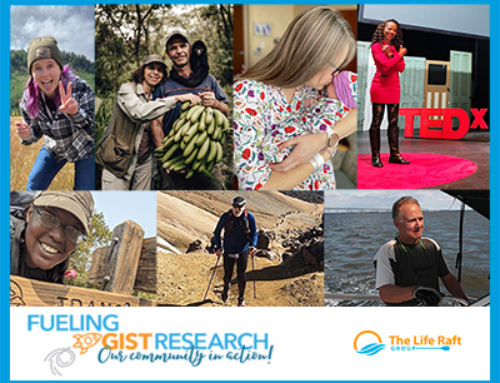On April 6th, 2018, Executive Director, Norman Scherzer; Data Analyst, Jerry Call; Real World Evidence Scientist, Yu Wang, and Patient Registry Director, Denisse Montoya, of The Life Raft Group, were invited to present at the Oncology Center of Excellence Research Rounds at the Food and Drug Administration (FDA). The goal of this presentation was to illustrate, based on data from the LRG Patient Registry, how overall survival in advanced GIST patients has improved over time and how this correlates with the ability to access new drugs.
During this presentation, our team compared data from the LRG database to data from different studies, including clinical trials. Results showed that patients in our database had a better overall survival rate than patients in such studies. The improvement in overall survival is strongly linked to the access of subsequent lines of treatment after first line treatment fails. Real world evidence helps to provide a faster understanding of the efficacy of oncology drugs by enhancing the generalizability of clinical trial results to patient populations not studied in registration trials.
Another possible correlation to higher overall survival in our database might be due to patient engagement. Being a proactive and involved patient has a positive effect on patient outcomes. Engaged patients tend to take preventive measures, which could include mutational testing, constant evaluations and check-ups.
This presentation allowed the Life Raft Group to demonstrate the importance of real world data in current GIST research. This type of data can provide patients, healthcare professionals, and researchers with first-hand information about people with certain conditions, both individually and as a group, to increase the understanding of the GIST patient’s journey.
We would like to emphasize that none of this data could have been obtained without the valuable help of our courageous patients (particularly those who gave all), caregivers, and collaborators. The Life Raft Group truly believes that collaboration will drive us closer to a cure. Therefore, we look forward to more potential collaborations that will grow and develop GIST research.


